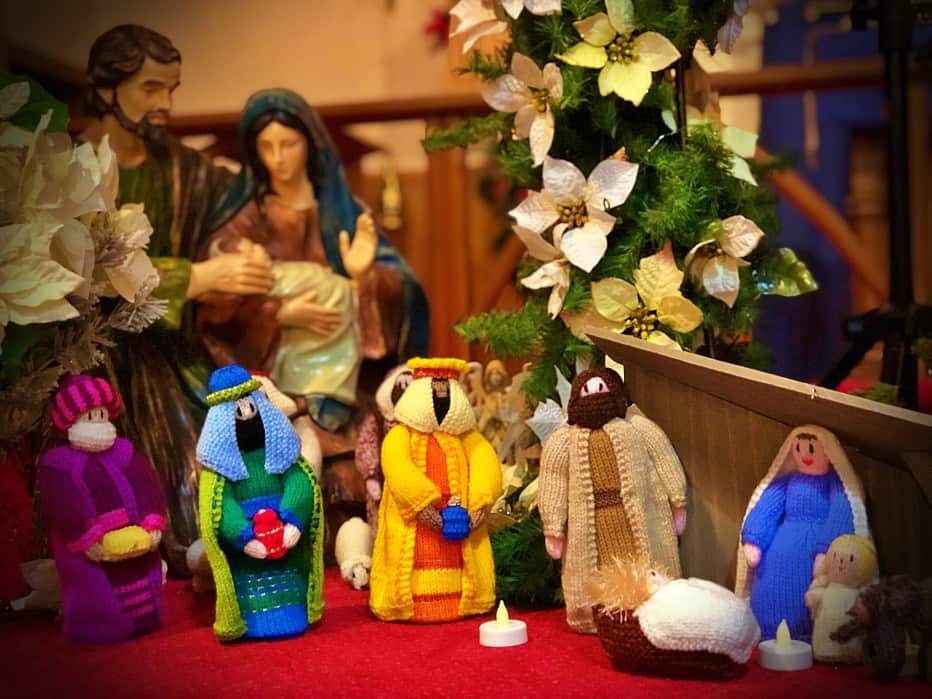
December 25. Is it Jesus’ birthday? When told that it is not, people often express disbelief. Some start questioning faith. Some begin to doubt, convincing themselves that they are being misled. I recommend an open mind; let us explore the Christmas story. I don’t promise, but it happens. After the discovery, God draws you closer to him. Knowledge, the right one, leads to enlightenment – an encounter with the Risen Lord.
The communal spiritual preparation for December 25 happens in varied ways, like gathering to sing carols, displaying a nativity scene, etc. I visited St. Bartolomeo Anglican Church, Grimshaw for an ecumenical carol singing ceremony in 2019. I was impressed with the hand-crocheted nativity scene. That’s the feature image you notice for the blog. I was told a unique story. Annette and Nel Nelson visited their family in the UK, a few decades ago during the Christmas season. As I remember, they were invited to a Christmas party where Annette admired the crocheted nativity scene. Upon returning to Canada, the Nelson received a package from England. And you guessed it. The family made another one for the Anglican Church in Grimshaw and parceled it to Canada. Since the following year, the church is displaying an interesting Christmas gift as a part of the nativity scene. Christmas creates memories, indeed.
How December 25 became Christmas day?
Constantine Effect on Christianity
The early Christians only celebrated Easter, recalling the main event of Jesus’ death and resurrection. You can picture Christians operating from catacombs amid persecution. But when Constantine the Great converted, Christianity became the state religion. There was no difficulty in celebrating liturgical events in public. Moreover, the number of Christians increased.
The Side Effects of Increasing Numbers
Now the followers of the way had a problem: the new converts were less rooted in the essential experience of Jesus as the Risen Lord and Saviour. It gave rise to a vulnerable situation, to continue their pre-Christian customs. New Christians failed to see why they have to give up their former customs. The new converts wanted to keep ties with their family members, who had not accepted Christianity. The newcomers under emperor Constantine had fragile Christian connections to stand alone or stay away from their families.
The Symbolic Winter Solstice
So, the new Christians started to participate in the feasts of pagan gods. I wouldn’t say I like the word pagan. Assume they started honoring their former gods. One such example is the feast in honor of Sun-god on or around the winter solstice (December 22). People profusely thanked the Sun-god as this day forward the harsh winter would wane, daylight increase, and life becomes a bit more pleasant – a new life in nature emerges.
The dominance of December 25
What started as a symbolic substitute to Sun-god, ignorance deemed it as the actual birth of Jesus. What happened? The Church chooses a date closer to winter solstice to honor the true Sun – Jesus, the light of the world (Luke 1:78). As the winter solstice is the end of cold and the dawn of warmth, the birth of Jesus is the beginning of our salvation – out of darkness into wonderful light. Once again, I state what you already know: December 25 is NOT the actual birthday date of Jesus. It’s a day we symbolically remember Jesus’ birth.
The effect of December 25 on other Christian feasts
The popularity of Christmas on December 25 grew in the Christian world. The Church started to remember other events in the life of Jesus. The feast of the annunciation is placed precisely nine months earlier, on March 25. The Church celebrates the feast of circumcision after eight days of Christmas. Now it is known as the Baptism of the Lord. Similarly, the Church introduced parallel feasts in honor of Mother Mary. The Church established the feast of Immaculate Conception on December 8, and nine months later, Mary’s birth was placed on September 8.
Can we know when Jesus was born?
I am not sure about that one. There is little to no evidence on the precise date and time of the birth of Jesus. The important thing is what Jesus did for us. The modern-day obsession with the biographical details misses the point: why Jesus came into the world. Jesus is a messiah, not just a historical figure. Christians celebrate Christmas because Jesus is the savior – there is always a deeper purpose to life than facts on a certificate.
Is Shopping-god replacing the Son-God?
Today, Christmas is becoming more of a shopping festival, exchanging gifts and a food event, which is aptly called Happy Holidays. The symbolism of gratitude – remembrance, and anticipation of Christ – fade as consumers bing on material stuff. As it is said, put Christ back into Christmas – I would say, add Holy in Holidays. That’s a sense of sacredness. You have a purpose beyond your dreams. We all are spiritual beings in human form, with a Christmas story: Emmanuel leading to life in abundance.
Something for you …
Need funny and thought-provoking stories about priests, buy on amazon The Uncommon Priest: Incredible Stories You Never Read
Check out my spiritual videos on YouTube: Feroz Fernandes
ferozfernandes.com is a participant in the Amazon Services LLC Associates Program, an affiliate advertising program designed to provide a means for sites to earn advertising fees by advertising and linking to Amazon.com.
Thank you Fr. for the reminder that the holiness of Christmas is in the message and not the commercialized society that we seem forced upon us. God bless you for spreading the message on you tube and for your blogs. Really enjoy them and look forward to the next one
Thank you, Eileen.
Blessings. Your few words here motivates me to do more for the proclamation of the Gospel.